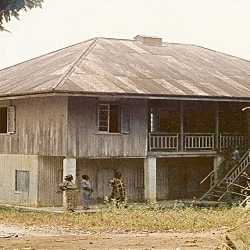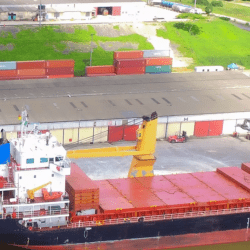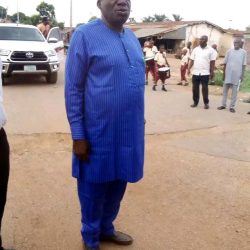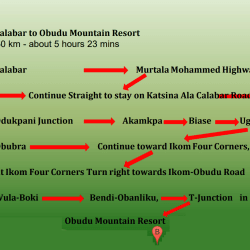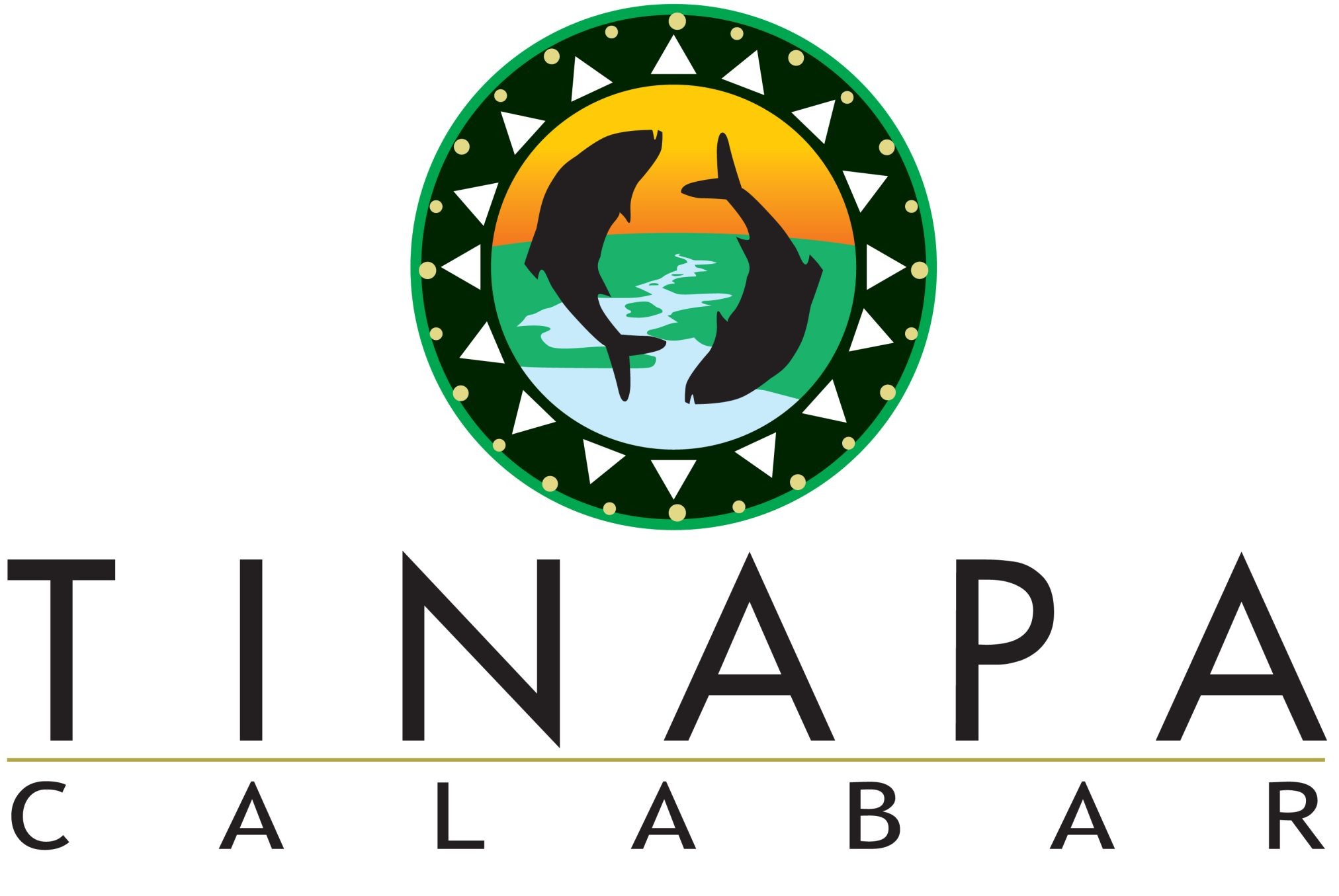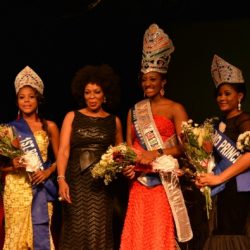Mary Mitchelle Slessor arrived Nigeria in 1878, under the auspices of the United Free Church Of Scotland now the Presbyterian Church Mission.

She resided in Akpap Okoyong, Odukpani Local Government Area where she vehemently fought for the abolition of the ancient custom of killing of twin children and their mothers.

She built herself a two bedroom mud house with a veranda, a store and a parlour. She called it a “Caravan” while the villagers called if “fine pass all”.
In 1889, a Missionary Carpental, Mr. Owens, was made to put up a more permanent structure for her. The walls were made of iron sheets while the doors and windows were made of wood. The staircase leading to the first floor had 21 steps, and was supported by two pillars and wooden railings. Since her death, the Odupkani Local Government Council has used the house as a Rest Home for other Missionaries and as a Primary Health Care Centre. Today, the property is restored and is a tourist site.
Mary Slessor
Mary Slessor, a Dundee mill girl, was inspired to travel to Calabar in Western Africa to become a missionary in 1876.
Her determination and spirit and the strong connection she made with the local tribes while living with them, meant that she became much more than a missionary and is remembered and celebrated there still, 100 years since her death.
Although the first woman to be depicted on a Scottish bank note, she is perhaps now less well known in Scotland. These pages aim to tell her story and celebrate her achievements and continuing legacy, which today still inspires and benefits the people of Southern Nigeria and beyond.
More on Mary Slessor
Mary Mitchell Slessor was born on 2nd December 1848 into a working class family in Aberdeen.

The family moved to Dundee in 1857 in search of work. Her father was a trained shoemaker but due to his struggle with alcoholism, the family suffered very severe hardship. Mary, her mother and older brother Robert had to find work in the mills to support the family, she had five younger siblings and they all lived in a one room house in a slum area of Dundee.
The experience of living in poverty and struggling to survive helped Mary to develop the resilience, drive and determination that would prove invaluable in her later life as a missionary in Africa.
Mary became a mill girl in the Baxter Brothers and Co Ltd. Lower Dens Mill and attended the mill’s half-time school. The Scotland Education Act of 1872 encouraged employers to provide some education for the children that they employed. This meant very long working days for the children who would often attend school for six hours after they had finished their shift in the mill. By the time she was fourteen, Mary was a linen power loom weaver, a skilled job. She became an avid reader and like David Livingstone, would read when she could during her working day, with a book propped on her loom.
Cross River
Created: 27 May 1967
Cross River was initially created in 1967 as South-Eastern State
Name
In 1976 the state was renamed as Cross River, referring to the River Cross or the River Oyono. The river rises from the Cameroon Mountains and empties itself into the Atlantic Ocean.
Capital: Calabar


Boundaries
Cross River State is bounded to the East by the Republic of Cameroon, to the South by Akwa-lbom State and the Atlantic Ocean, to the West by Abia and Ebonyi States and to the North by Benue State.





Rank in land size and population
The State is the 19th largest state in Nigeria in terms of size and 28th in terms of population.

Major languages
Ejagham and Efik are the major spoken languages in Cross River State.

Efik language
The Efik language is widely spoken in Cross River State, and as far as Arochukwu in bordering Abia State.
Capital city
The capital is Calabar, one of Nigeria’s cleanest and safest cities. It also has a major seaport.

Local Government Areas
There are 18 Local Government Areas (Abi, Akamkpa, Akpabuyo, Bakassi, Bekwarra, Biase, Boki, Calabar Municipal, Calabar South, Etung, Ikom, Obanliku,
Obubra, Obudu, Odukpani, Ogoja, Yakurr, and Yala) in Cross River State that make up three senatorial districts.

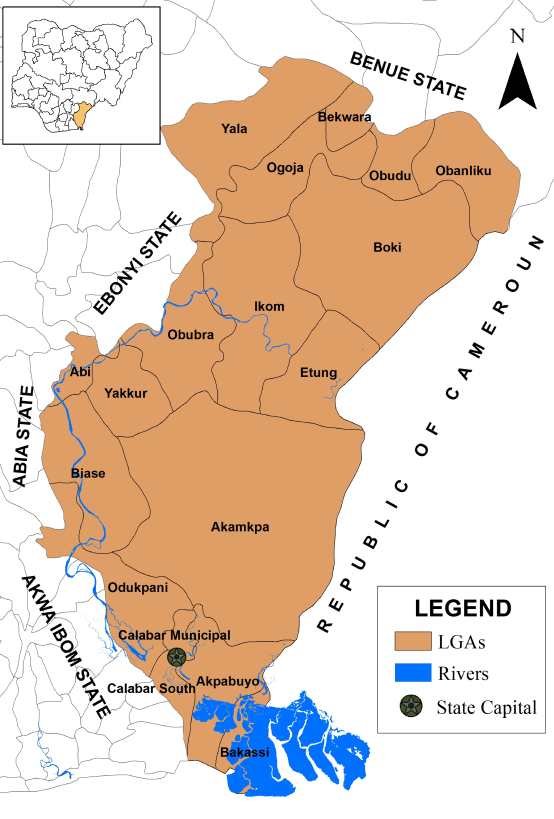
Major cities
Cross River State major cities are Calabar, Ugep, Ikom, Obudu, and Ogoja.
Major road
Only one major (federal) road connects 10 local government areas from the popular Watt Market in Calabar. They are Calabar South, Calabar Municipal,
Odukpani, Akamkpa, Biase, Yakurr, Obubra, Ikom, Yala, and Ogoga. The road still goes on to Kastina-Ala in Benue State.

Forests in Boki Local Government Area
The rarest animals and plants in Cross River State can be found in forests located in Boki Local Government Area.
Species of butterflies in Akamkpa Local Government Area
One of the highest concentration of different species of butterflies in the world can be found in the Akamkpa Local Government Area of the State.
Sparsely settled state
With an average population density of about 65 persons per square kilometre, Cross River State is about the most sparsely settled state in Southern Nigeria.

Largest carnival in Africa
Cross River State boasts of being the venue for the largest carnival in Africa.
Various annual festivals are the Cross River State Carnival (26-29 December) in Calabar, the Yakurr Leboku Yam festival (28 August) in Ugep and the Calabar Boat
Regatta.
Tourism
Cross River State is the leading tourism state in Nigeria. Especially the capital, Calabar. Visitors from different parts of Nigeria come to the city in large numbers
all year round.
Tourist attractions are, the soaring plateaus of the mountain tops of Obanliku, the ObUdU Mountain Resort, the Rain forests and Mountain walkway canopy of Afi,
Waterfalls at Agbokim and Kwa, the monoliths at Ikom, Cross River National Park at Boki, and the Obubra Lake at Obubra.
Others are the Etanpim Cave in Odukpani, the Tinapa Business Resort, Calabar Marina Resort (which houses the Calabar Slave Museum, the Cinema, and a view of the Calabar River where one could take a boat ride around or to Oron in Akwa-lbom State), Calabar Residency Museum, and Mary Slessor Tomb.
Accessibilty
Cross River State can be accessed by air through the Margaret Ekpo International Airport at Calabar and the Bebi airstrip at Obanliku; by sea through the Calabar
seaport and by road from different parts of the country to other parts of the state.
Crops
The main crops can be found in the northern and central parts of the state. These are cassava, yams, rice, plantain, banana, cocoyam, maize, cocoa, rubber,
groundnut, and palm produce. While in the south, various kinds of seafood are mostly eaten.
Livestock
Major livestock in the State are cattle, goats, and sheep. Rearing activities are mainly undertaken by the Fulani herdsmen, except in Obanliku at the Obudu Cattle
Ranch where organized cattle ranching takes place.
Mineral resources
Cross River State Mineral resources include limestone, titanium, tin ore, ceramic materials, and hard stone.
Education
Tertiary educational institutions include the University of Calabar and the Cross River State University of Technology both in Calabar, the Ibrahim Babangida
College of Agriculture in Obubra and Technical College, Ugep.
Famous people
Notable people from Calabar include Louis Edet (Nigeria’s first indigenous Inspector General of Police), Etim Henshaw (The Red Devils of Nigeria’s famous
football team captain), Margaret Ekpo, Donald Duke, Benedict Ayade, Kate Henshaw Nutall, Florence Ita-Giwa, Victor Ndoma-Egba, Shan George, and others
too numerous to mention.
